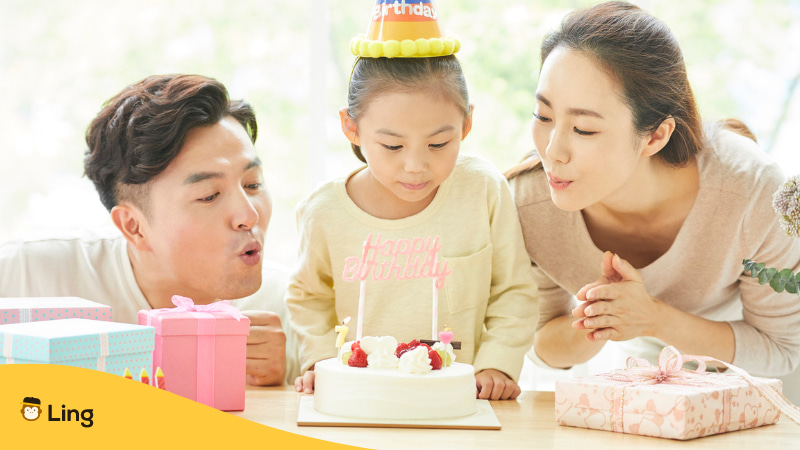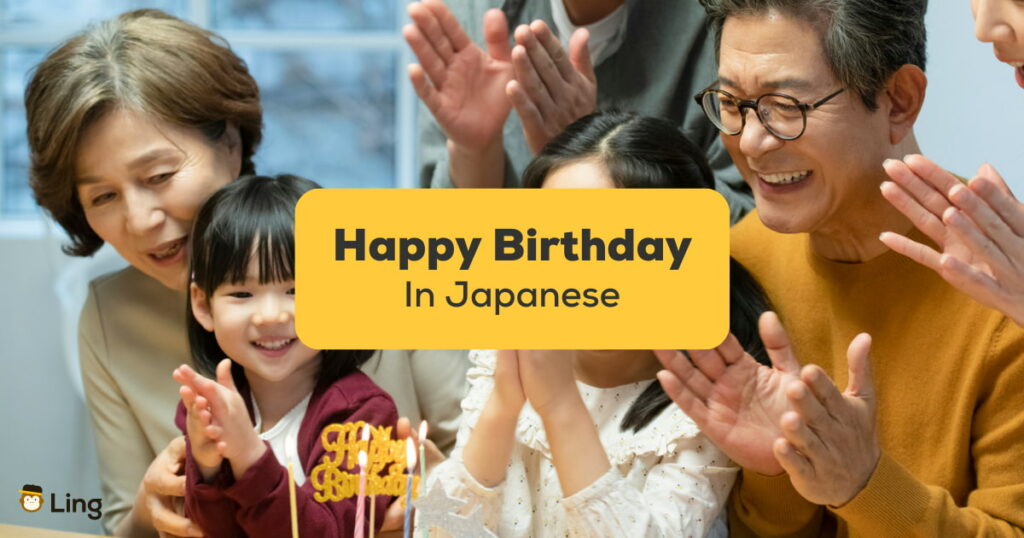Interested in impressing a birthday celebrant? Instead of plainly greeting in English, you can say “Happy birthday” in Japanese as “お誕生日おめでとう(pronounced as otanjoubi omedetou).” This is the most casual way of wishing someone a happy birthday in Japanese.
If you are the one who is being greeted by your friends with such a phrase, it would be wise to simply respond with a hearty 誕生日のお祝いありがとう(pronounced as tanjoubi no oiwai arigatou) to say thank you. If you are interested to learn more about Japanese and how you can send a birthday wish in different styles, you’ve come to the right place!
How To Say Happy Birthday In Japanese: 4 Ways
Aside from mastering the basic Japanese greetings, learning how to greet someone with a wonderful birthday is a great way to instantly connect with the locals. Who knows, you might end up having a best friend just by simply expressing yourself in their language. Take note of these 4 basic phrases to wish happy birthday in Japanese.
How Do You Pronounce Happy Birthday In Japanese?
If you want to learn how to pronounce the casual version phrase to say it to your Japanese friends, listen to the following sound and practice as much as possible!
Other Birthday Wishes
Now that we know what each phrase means, we’d also love to help you give additional birthday wishes.
How To Say Your Birthday In Japanese
It’s almost as easy to tell people your birthday in Japanese as it is in English! You just put the day of the month after the month itself. If your birthday was March 4th, for example, you would say: 私の誕生日は3月4日です (pronounced as Watashi no tanjoubi wa san gatsu yokka desu)

Words Related To A Japanese Birthday Party
Now that we have learned all the phrases used in Japan related to birthdays, it is only fitting that we also give you a few Japanese words which you might encounter on traditional Japanese birthdays or when speaking about this topic.
| English | Japanese | Pronunciation Guide | Sound |
|---|---|---|---|
| Birthday | 誕生日 | Tanjoubi | |
| Gift | 贈り物 | Okurimono | |
| Cake | ケーキ | Keki | |
| Toast | 乾杯 | Kanpai | |
| Party | パーティ | Paatī | |
| Food | 食べ物 | Tabemono |
What Is The Culture Of Birthdays In Japan?
No matter where you are in the world, it is impossible not to get invited to any birthday celebration, may it be for your close friends, family members, or colleagues. For many of us, this wonderful day is not just about the symbolism of aging but also a reminder to embrace someone’s life and the challenges they overcame. Therefore, sending celebratory phrases makes sense!
So, if you are truly interested in making your close Japanese friend happy and feel special, it would be wise to learn some birthday messages in the Japanese language. Unlike western cultures, though, the Japanese people are quite particular with how they greet someone for their birthdays. For instance, they make sure that their birthday wishes align with how they view their relationship with the individual, seniority level, and level of formality.
As most of us know, the Japanese language makes use of the honorific prefix or 敬語 (Keigo) to prevent miscommunication or offending someone. For this reason, even their birthday greeting may differ depending on the person they are speaking with. To learn more about why birthday wishing is essential in Japanese culture, continue reading below.

Significance Of A Birthday Greeting In The Japanese Culture
The Japanese people are generally not as expressive as other nationalities, and several local phrases are reserved only for special occasions. However, one special occasion that many young people are excited about is celebrating their birthday party since this is one of the specific times when they get warm greetings from their family, friends, and their special person. For this reason, they will truly appreciate hearing a great birthday wish from a close friend like you!
In addition to saying a happy birthday in Japanese, you might also want to learn a few Japanese traditions, which can make your greetings even more special.
- When giving gifts, you are free to sign the card using fun colors, especially for a Japanese friend with whom you are truly close. However, it is a standard practice to use blue or black ink when you are gifting it to a superior, boss, or colleague you are not really close with.
- Just like in Western culture, birthday celebrations usually include a birthday cake and some drinks. However, please note that only Japanese people who are 20 years old or older can legally drink alcohol.
- For the locals, the age of 16 is also important in the sense that it signifies the completion of the five cycles of the Chinese Zodiac.
- When it comes to Japanese birthday cards and gifts’ aesthetics, please remember that the locals view black wrapping negatively as it is best known as the color of death. As a rule of thumb, always go after fun, lively colors.
- When choosing a gift, stay away from giving 4 or 9 pieces of something as it is bad luck in Japan.
Now that we have an idea of how to celebrate Japanese birthdays, let’s now draw our attention to the basic greetings.
What Are The Japanese Birthday Traditions?
Aside from greeting someone with a happy birthday in Japanese, there are several details that you must know to properly celebrate this special occasion. After all, every country has its own ways of celebrating an event, depending on its traditions, history, and religion. For instance, locals in most Western countries usually throw surprise birthday parties on the day of someone’s actual birthday. However, that is not the case for Japanese birthdays. This is because the locals celebrate it in the New Year! Let’s learn more about that below.
Do The Japanese Celebrate Birthdays?
As we walked the streets of Tokyo, we asked around and discovered that the Japanese celebrate birthdays too! There are, however, two trains of thought related to this special event. First, many shared that it used to be held in the new year. Therefore, everyone in the country will celebrate only on that specific day! One reason for that is that the Japanese culture provides more emphasis on the idea of aging together (or collective mentality). Add to that the fact that New Year’s day is very special for them, and it is customary to give gifts at this time of the year.
Today, younger Japanese claim that they celebrate their birthdays on the exact day as in most countries. Interesting, right? To this day, many parents are veering away from the traditional and are celebrating their children’s birthdays on the exact date. Since this is an intimate event for many, they are expected to only be with their close family and friends during this time.
Here’s one surprising thing: Did you know that it is only until the 1950s wherein the locals began to celebrate individually? After World War 2, there was a rapid rise in the number of tourists and migrants in Japan. For this reason, the country slowly shifted and adopted foreign traditions too, including the idea of individual birthday celebrations.
How Do The Japanese Celebrate Their Birthdays?
In Western countries, birthdays are usually extravagant and attended by many people. This is not the same as the case in Japan. With simplicity in mind, the locals do not hold big birthday parties or ask restaurants to be closed as a venue. In Japan, it is celebrated with a small group of people at small restaurants or at home. It is very rare to hear celebrants invite others to their party too! If you have colleagues while working in Japan, then they will probably invite you to dine out, and they will pay for your meal as a gift.
There is also not much traditional food to be served during birthdays except for cakes and Tai. Tai (鯛) is a sea bream known as the “king of fish” in Japan and is best known to bless someone with good luck in the future. One reason why Tai is served during special events is because of its red skin and syllabic feature. Basically, red is an auspicious color, while the final syllable for the word Tai reminds the locals of occasions of “omedetai” nature.
What Are The Milestone Birthdays In Japan?
Age is an important part of Japanese culture as reflected by the manner in which they structure their expressions when speaking with someone older or younger than them. This is why the locals usually ask foreigners to do a 自己紹介 (じこしょうかい) or Jikoshoukai. Jikoshoukai is a Japanese word that refers to a brief self-introduction wherein you are expected to say something about your name, age, profession, and country where you are from. Once they know your age, they will adjust their manner of speaking with you.
In the country, there are apparently two ways by which one can count age- Kazoedoshi (数え年) and Mannenrei (満年齢). In the case of kazoedoshi (数え年), this means that you are already 1 year old by the time you are born and you are expected to age on New Year’s Day. For mannenrei (満年齢), you will be born at age 0 and will turn 1 on your next actual birthday. This means that mannenrei (満年齢) is the one closest to what many Western countries are used to.
Milestone Set #1: Eary Childhood Celebration
As we know, the first few days after birth are the riskiest ones for both the mother and the newborn child. For this reason, the locals celebrate Oshichiya (お七夜), which is the celebration for the seventh night after the child is born. During this time, the parents are expected to finally announce the name of their child.
The next celebration to watch out for is for 1-year-old kids. Erabitori is similar to the Chinese fortune game known as zhuazhou and is viewed as an important custom for predicting what the child’s future and personality will be. In this event, the parents and family members will lay a varying number of items with symbolic meaning, and whatever the child chooses will determine what will be his/her future strengths and/or weaknesses.
So if your child chooses a calculator or money, then you might have to save up for your future accountant or business person! If she chooses bags, perhaps she will be part of the fashion industry in the years to come!
The next one is the Omiyamairi (お宮参り), or the milestone for reaching the child’s first month on Earth. On this day, the kids will be dressed in special clothes called Ubugi (産着) and will be brought to the nearest Shinto shrine. The parents (sometimes along with the extended family members) will have to pray for their child’s happiness and health.
After 100 days, the next celebration is known as Okuizome (お食い初め). While the child cannot still munch on solid food that much, the parents will prepare traditional goodies as it symbolizes the parents’ wish for the kid to never run out of food in the future. This is basically viewed as the first-ever meal of the child and must include Ichijuu Sansai (一汁三菜, one soup, and three dishes). The number of food may go beyond that so long as each has symbolism.
The next one is the Hatsu tanjoubi (初誕生日), or the actual first birthday, wherein the baby will have one giant pound of Isshou mochi (一生餅). This type of mochi symbolizes that the kid will never starve, and it is surprisingly supposed to weigh around 2kg! The kids should either carry it on their back for a short period of time or at least step on it.
The last one is known as the Shichigosan (七五三) or the customary Japanese rite of passage for three- and seven-year-old girls, five-year-old and sometimes three-year-old boys. It is annually held on November 15 to celebrate life and wish for longevity.
Milestone Set #2: Young Adult Celebration
As for young adults who will turn 20, they will have to go under Seijinshiki (成人式) or the coming-of-age ceremonies. At this time, the celebrants will wear traditional Japanese attire and will receive gifts and souvenirs from their family and friends. More importantly, the government will call upon the celebrants to cast blessings onto them. Don’t forget to say your thank yous!
Milestone Set #3: Celebrations For Longevity
Japan is known to have one of the highest life expectancies in the whole world. With this said, it is traditionally important to celebrate particular age points like the following:
- Kanreki (還暦) or the 60th
- Koki (古希) or the 70th
- Kiju (喜寿) or the 77th
- Sanju (傘寿) or the 80th
- Beiju (米寿) or the 88th
Are You Interested In Learning More Japanese?
As we reach this part of the post, we hope that you were able to learn the best ways to wish someone a happy birthday in the Japanese language. If you enjoyed this post and would love to learn more, we highly recommend that you check out the Ling app.
The Ling app is a free language learning platform complete with Japanese lessons, games, and learning content that will help you improve your language skills instantly. By just using the app for 10 minutes a day, you’ll get to understand the intricate grammar details, writing system, and word choice, which are all critical in expressing a meaningful sentence.
What sets this gamified app apart is that all the lessons from the inside are co-authored by real native speakers and language professionals, which means that you’ll get the best resource right on your mobile device for free. Download the Ling app on the Play Store or App Store today to start progressing your Japanese skills!









































2 Responses
Thank you for the interesting information about birthdays in Japan.
To me, something does not seem correct about the following sentence.
“… However, please note that Japanese people who are under the age of 20 are the only ones who can legally drink alcohol. …”
Perhaps the word ‘under’ should be replaced with ‘above’?
Hi Greg! You are right, thank you so much for the correction!